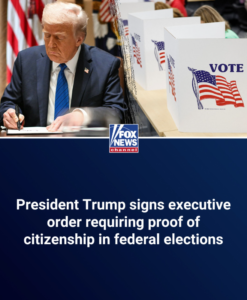On March 25, 2025, President Donald Trump signed an executive order mandating that individuals provide documentary proof of U.S. citizenship when registering to vote in federal elections. The order also requires that all ballots be received by Election Day to be counted. President Trump emphasized the significance of this action, stating, “I sign all of them, but to sign this one is a great honor.”
Key Provisions of the Executive Order:
-
Proof of Citizenship Requirement: Individuals must present government-issued documentation, such as a U.S. passport or a REAL ID, to register to vote in federal elections.
-
Ballot Receipt Deadline: Only ballots received by the end of Election Day will be counted, aiming to standardize the ballot counting process nationwide.
-
Federal Funding Conditions: States that fail to comply with these mandates risk losing federal election-related funding.
-
Data Sharing and Enforcement: The order directs the Attorney General to establish information-sharing agreements with state election officials to identify and prosecute instances of election fraud.
This executive order aligns with President Trump’s longstanding focus on election integrity. He has frequently expressed concerns about potential voter fraud and emphasized the need for stricter measures to ensure fair elections. The President remarked, “This will end it, hopefully,” referring to his goal of eliminating election fraud.
Support and Opposition:
-
Supporters’ Perspective: Proponents argue that the order is essential for safeguarding elections from foreign interference and ensuring that only eligible citizens participate in the voting process. Georgia Secretary of State Brad Raffensperger expressed gratitude, stating, “Thank you, President Trump, for this executive order ensuring that only American citizens decide American elections.”
-
Critics’ Concerns: Opponents contend that the order could disenfranchise eligible voters, particularly marginalized communities who may lack immediate access to the required documentation. Colorado Secretary of State Jena Griswold labeled the order an “unlawful” weaponization of the federal government, asserting that it aims to make voting more difficult for citizens. Legal experts also question the constitutionality of the order, noting that the U.S. Constitution grants states the primary authority to regulate elections. Justin Levitt, a constitutional law expert, highlighted that while federal agencies provide election support, the executive branch’s authority in this domain is limited.
Potential Legal Challenges:
The executive order is anticipated to face legal challenges on several fronts:
-
State Authority: The Constitution grants states the power to oversee elections, which may conflict with the federal mandates imposed by the order.Voter Suppression Concerns: Civil rights organizations may argue that the proof of citizenship requirement disproportionately affects certain voter demographics, potentially leading to disenfranchisement.
-
Funding Withholding: The threat to withdraw federal funds from non-compliant states may be contested as an overreach of executive power.
-
As the nation approaches the next election cycle, the implementation and impact of this executive order will be closely monitored, with significant implications for the American electoral process.

